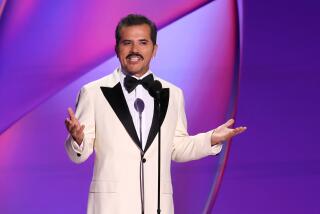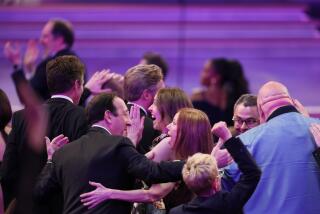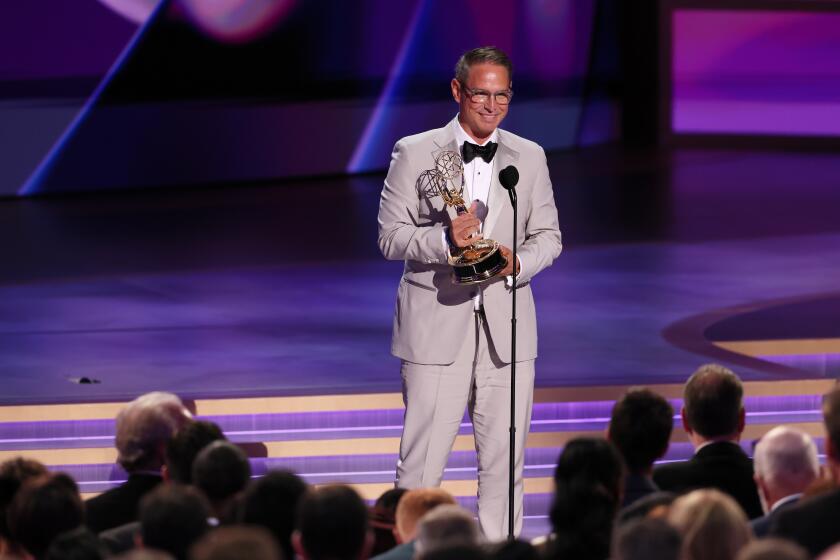Queer actors are finally playing queer roles. Next up? More chances to play it straight
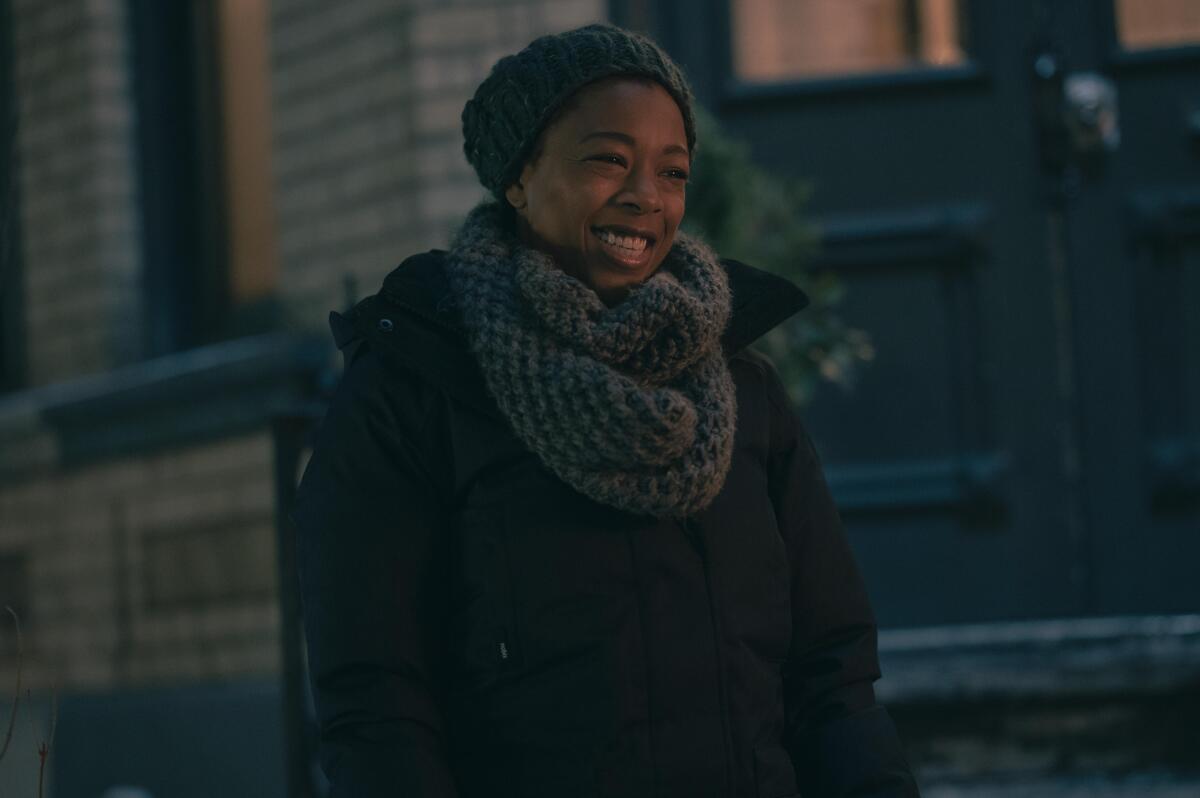
It’s been a particularly queer Emmy year. Not only did “Pose” breakout Mj Rodriguez make history as the first trans performer to be nominated in a lead acting category, but other openly LGBTQ actors earned nods for playing LGBTQ characters, including Carl Clemons-Hopkins and Hannah Einbinder (“Hacks”), Billy Porter (“Pose”) and Samira Wiley (“The Handmaid’s Tale”).
Even better, long-out queer stars such as Gillian Anderson (“The Crown”), Jonathan Groff (“Hamilton”) and “Saturday Night Live” standouts Kate McKinnon, Bowen Yang and host Dan Levy were recognized by the academy for playing everything. This latter lauding, however, remains a rarity. John Benjamin Hickey — whose Colin in “In Treatment” is heterosexual — has been outspokenly gay for years, but Emmy-nominated Emma Corrin was not yet publicly queer when she was cast as Princess Diana in “The Crown.”
For the record:
3:29 p.m. Aug. 18, 2021A previous version of this article said Jonathan Bailey was not yet publicly gay when he won the role of Viscount Anthony in “Bridgerton.” He came out before being cast.
Jonathan Bailey was publicly out when he won the role of ladies’ man Viscount Anthony in “Bridgerton.” His sex symbol status — which spans fans of all genders and orientations — proves queer actors can convincingly portray straight roles. But many may still feel unconvinced, choosing to remain in the closet.
“Once they come out, lesbian, gay and bisexual actors have rarely been considered for straight leading roles,” says GLAAD director of entertainment media Jeremy Blacklow. “We look forward to a time when LGBTQ actors can bring their full, authentic selves to their work without the fear of discrimination.”
“I went to Juilliard. I’m a trained, classical actor. I can do so many different things,” says Wiley, who was closeted when she landed the role of Poussey in “Orange Is the New Black” but out when cast as Moira in “Handmaid’s.” Both roles are lesbian, and Wiley nearly declined the invitation to audition for the latter, which earned her a first Emmy in 2018. “I didn’t want to be put into a category where I could only play LGBT characters. I wanted to just be seen as an actor. And I definitely want to be seen for straight roles too.”
According to Wiley, queer performers are more than qualified to play hetero parts. “That’s the lens we’ve all grown up looking through,” she says. “Every television show I’ve seen growing up, every picture in a magazine, every depiction of love.”
“Of course queer actors can play straight, straight actors can play queer,” adds T.R. Knight, Emmy-nominated in 2007 for playing hetero heartthrob George in “Grey’s Anatomy” and who now — alongside fellow out “The Flight Attendant” cast member Griffin Matthews — plays gay in that Emmy-nominated series. “The question is, ‘Is that opportunity being given equally, or even close to equally?’ And the answer to that is definitely ‘No.’”
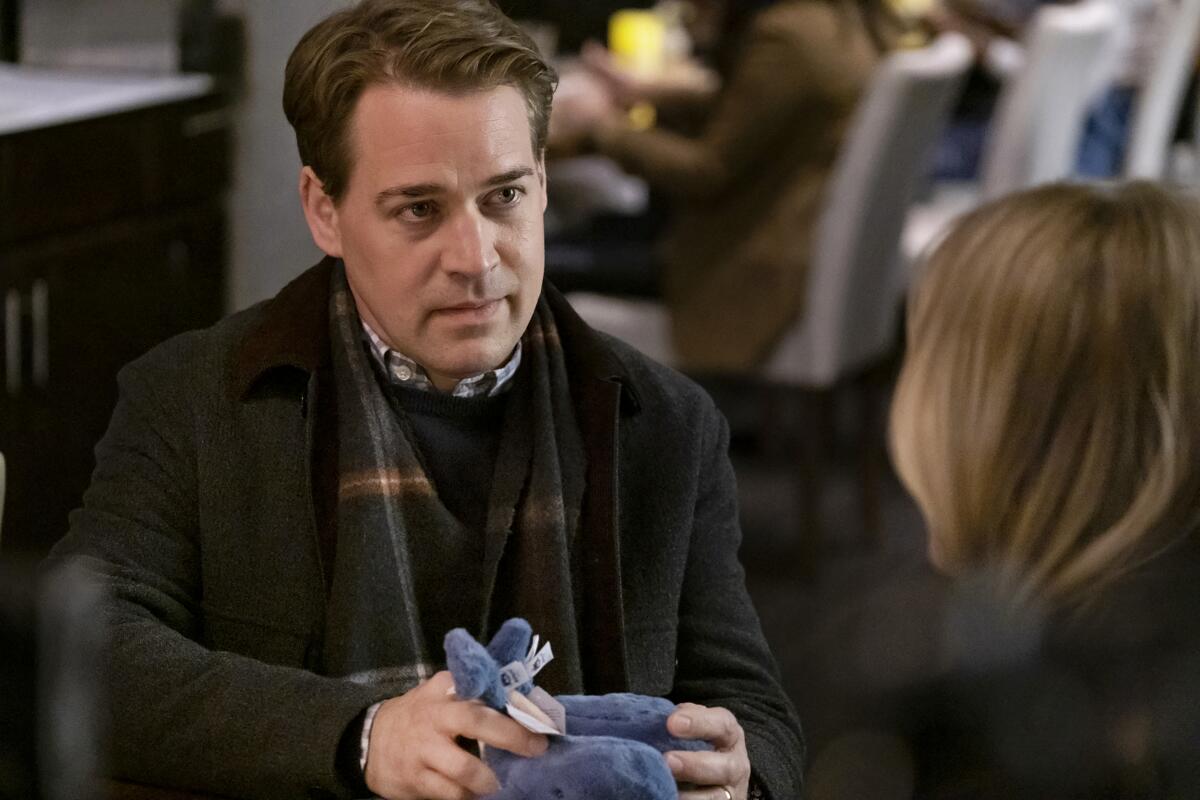
Wiley and Knight agree the access LGBTQ actors have to straight parts is at the mercy of casting directors, those frontline gatekeepers who — in the absence of clear direction from showrunners and/or studio executives — control who’s called in for which roles. “When someone’s motive is inclusive casting, inclusive representation — straight or queer or anywhere on that spectrum,” continues Knight, “they see things differently.”
Casting directors point out that every situation is different. “There isn’t a one-size-fits-all answer for every single situation,” stresses Kim Miscia, a nominee this year alongside business partner Beth Bowling for casting “The Flight Attendant.” “It’s a very complex issue that needs to be addressed on a case-by-case basis, with sensitivity toward the creative process and an eye toward casting unrepresented people.”
“In the 22 years we’ve worked together, we’ve always brought in gay and straight actors for straight and gay roles,” says Emmy-nominated Sharon Bialy of Bialy/Thomas & Associates, speaking of herself, business partner Sherry Thomas and associate Russell Scott. “I would never not allow a gay person to play a straight role. When I’m forced into that corner, my instinct is to say that’s not fair. I would like the world to be open to everybody.”
For each casting director interviewed here, a trans role is often where the open-door policy slams shut. “I fully believe trans people should play trans roles,” says Kelly Valentine Hendry, an out lesbian and LGBTQ activist who’s a first-time nominee this year for casting “Bridgerton.” Hendry does make some concessions, depending on the circumstances of the role. “If the actor predominantly had to play their character’s gender at birth [through most of the story], and the character’s transition happened at the end, I think that could be up for discussion.”
“It’s still such an underrepresented community that takes the most hostility from the public,” adds Thomas. “They’re just putting everything out there in a way that’s really challenging.”
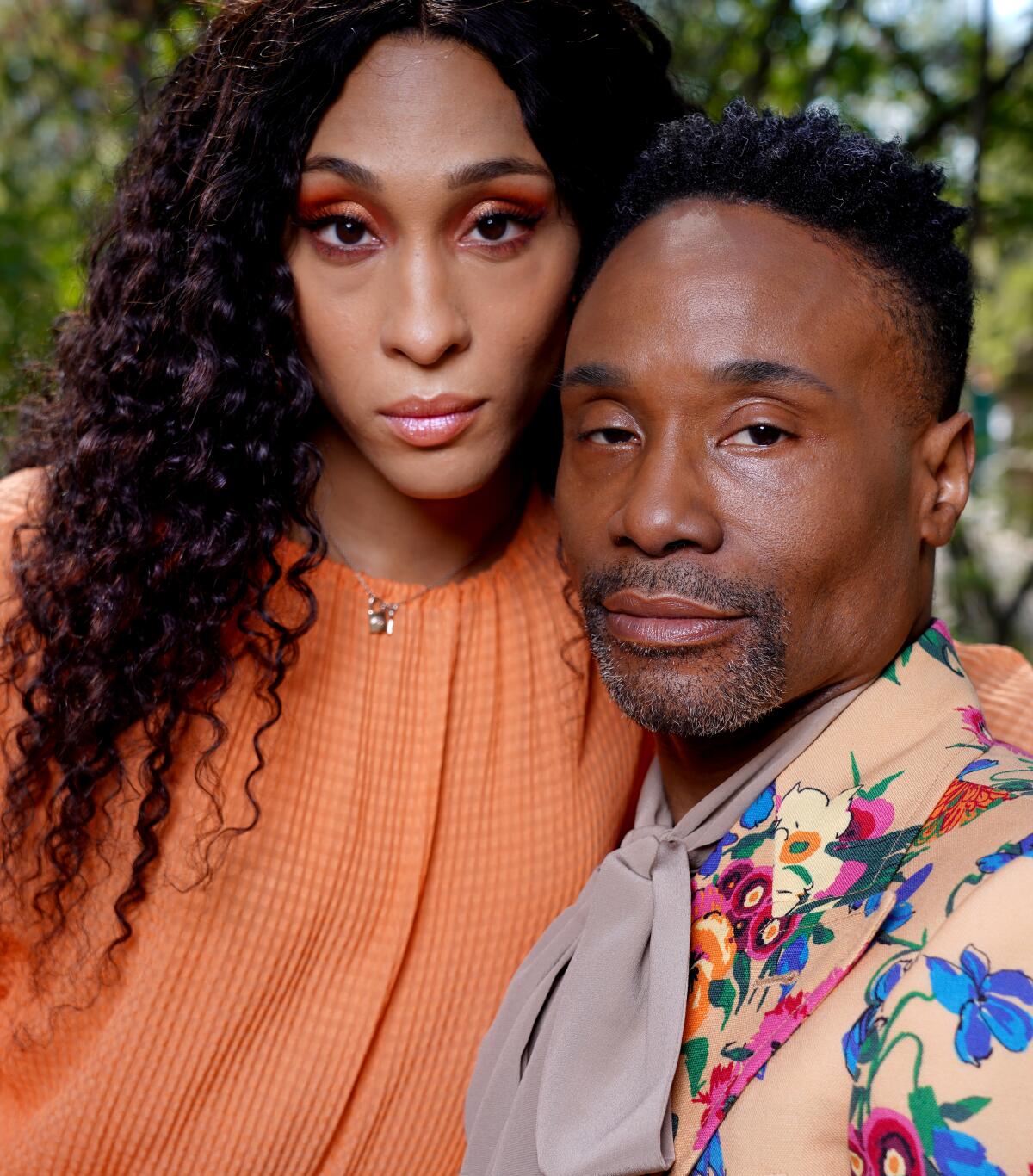
Bowling goes a step further, confiding that she and Miscia would not hesitate to cast a trans actor in a cis part. “As I was recently discussing with a prominent showrunner, if a trans actor comes in, nails the role and is the best actor, then that’s who we should cast. There is a movement. I think Hollywood — the industry as a whole — is aware of that.”
“In any movement, people need strong allies,” echoes Wiley. “It’s not gonna be just up to us.”
Flanking his fellow advocates, Grammy, Tony and Emmy winner Porter is proud to be part of the solution. “For my entire life, a character like Pray Tell was not possible, a show like ‘Pose’ was not possible. We have to acknowledge how far we’ve come,” he concludes. “We are the change we’ve been fighting for. Every time one of us gets a role, every time one of us gets recognition, it’s moving the needle.”
More to Read
From the Oscars to the Emmys.
Get the Envelope newsletter for exclusive awards season coverage, behind-the-scenes stories from the Envelope podcast and columnist Glenn Whipp’s must-read analysis.
You may occasionally receive promotional content from the Los Angeles Times.

